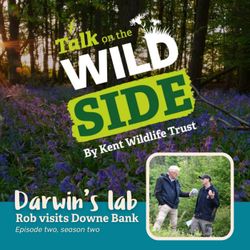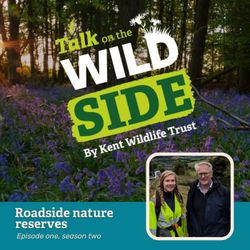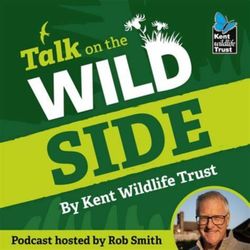Share

Talk on the Wild Side
Eco-Tourism at Elmley Nature Reserve
In this episode of Talk on the Wild Side, we explore the wetlands. First, we visit Elmley Nature Reserve, a private estate owned and managed by Gareth Fulton and his family. The reserve has been managed for nature since the 80's and is now an eco-tourism spot with luxurious private accommodation that brings people close to nature that wouldn't ordinarily visit. Rob also speaks to a volunteer about the reserve's owl population.
In his second interview, Rob talks to Kent Wildlife Trust's first apprentice Bella Sabin-Dawson about eco-anxiety and some of the ways we can all combat that feeling of helplessness. She is just a wonderful young person to listen to. Whilst at the University of Kent, Rob also spoke to Sam Maddison about the ongoing newt monitoring project that the Uni is doing and more.
Finally, Rob meets George Cooper, the founder of the Save Minster Marshes campaign. He's an avid bird lover whose contributions to bird ringing have helped make Minster Marshes a very well-documented site. Rob talks to him about the Save Minster Marshes campaign as well as touching on a more controversial topic - his work as a game-keeper.
Show links
More episodes
View all episodes

2. A Walk Through Time at Downe Bank
27:44||Season 2, Ep. 2🎙️ New Episode: A Walk Through Time at Downe Bank 🌿🦋Join Talk on the Wild Side as Rob Smith meets Kent Wildlife Trust Warden Paul Glanfield at the breathtaking Downe Bank Nature Reserve in Bromley! Once a favourite retreat of Charles Darwin, this rare chalk grassland is now under consideration as a World Heritage Site, and for good reason.Discover the vibrant biodiversity of this historic site, home to rare orchids and fluttering meadow brown butterflies. Learn how hardy sheep help maintain this precious ecosystem through careful autumn grazing. From the wonders of chalk grasslands to the fight against invasive species, this episode is a must-listen for nature lovers, conservationists, and history buffs alike.Did you know the site Sir David Attenborough himself filmed the series opener of Planet Earth III at Downe Bank?🎧 Tune in now and take a walk on the wild side!#Podcast #TalkOnTheWildSide #DowneBank #KentWildlifeTrust #CharlesDarwin #PlanetEarthIII #Biodiversity #Conservation
1. Roadside Nature Reserves
22:00||Season 2, Ep. 1Welcome to a brand-new season of Talk on the Wild Side! 🌿 In this feel-good season opener, our roving presenter Rob Smith hits the road to catch up with Bethany, Wild Road Verge Officer at Kent Wildlife Trust. 🚗🌾 Together, they explore how the charity, alongside an incredible team of volunteers, is creating vital spaces for nature right next to some of Kent’s busiest roads. Get ready for inspiring stories, fascinating insights, and a closer look at the wild side of conservation! 🐝 Stay tuned—this is one episode you won’t want to miss! 🎧💚
17. Sea Link with National Grid's Adrian Pierssene
21:01||Season 1, Ep. 17In this exciting episode of Talk on the Wild Side, Rob heads to the stunning Pegwell Bay to chat with Adrian Pierssene from National Grid about their ambitious Sea Link Project.This multi-million-pound initiative aims to supercharge the Grid's renewable energy capabilities by connecting Kent and Suffolk with an underwater cable. But there’s a twist—plans for a massive converter station at Minster Marshes, a cherished Local Wildlife Site, and a landfall point at Pegwell Bay, a Site of Special Scientific Interest, have Kent Wildlife Trust sounding the alarm.Adrian shares National Grid’s vision of boosting biodiversity as part of the project, but can cutting-edge infrastructure truly coexist with nature? Tune in for a candid conversation as we dig into the details, debate the possibilities, and explore the balance between progress and preservation!Update: Since the recording of this episode, the proposed mitigation site has been revised. On this update, National Grid states:“Following ongoing discussions with stakeholders including local authorities and Natural England, we have removed the wetland from our proposals. Instead, we have identified an area of existing arable farmland, approximately 10ha in size. In this new location, it is proposed to adapt existing arable farming practices in a way that is beneficial to important bird species such as golden plover. This will include measure such as maximising the amount of time that bare ground is maintained over winter, so that the foraging environmental is enhanced. We are also proposing skylark plots in these areas, which are unsown areas within arable crops, providing skylarks with access to nesting habitats throughout their breeding season.” Kent Wildlife Trust remains concerned about the suitability of this mitigation, saying: "The new site is situated near a busy A-road, with considerable noise and light pollution from the bustling Discovery Park. Furthermore, it lies outside the flight range of the Golden Plover, a species that thrives in large numbers at Minster Marshes. As a result, the Trust remains doubtful about its suitability as a refuge for wildlife."
16. Rewilding a churchyard in Sandwich
20:09||Season 1, Ep. 16A run down and overgrown medieval churchyard in Sandwich has been restored to a beautiful wildlife haven by a group of local volunteers. In this amazing story, you'll hear from the people who brought this churchyard back to life and find out what they discovered when they peeled the ivy back from the tombstones.It takes a community of passionate people to make a difference and you can really tell that has happened here in Sandwich. With a bit of organising and hard work, each person has found a role, whether that be to document the history of the place and the people buried here or clearing overgrown vegetation, they all work so hard to make this place a special site for anyone who wants to visit.Visit the project site here: https://stclementsandwich.org.uk/churchyard/Watch a shortened version of this podcast on YouTube: https://youtu.be/tmD5vOYhqOURead the transcript here: https://www.kentwildlifetrust.org.uk/blog/rewilding-churchyard-sandwich-podcast
15. Farming through natural systems
01:10:28||Season 1, Ep. 15Iain Tolhurst NBE is a pioneering organic farmer and owner of Tolhurst Organic Farms. This farm has made quite a name for itself because it is able to feed 350 families on 14 acres of what is classified as poor quality agricultural land up to now, without any government subsidies. He manages this land with minimal external inputs to the farm. This means no chemical fertiliser or pesticides. He also does this without any livestock or external fertility from animals. Nearly 20% of his farm is trees and an additional 40% set aside for green manure. So how does he do it?Iain's farming methods have been so well recognised that he was awarded an Order of the British Empire (MBE) for his services to agriculture. Iain believes in using natural farming systems to create soil fertility and enhance biodiversity. Could this be the future of farming?Visit the Tolhust Organic website to find out more: https://www.tolhurstorganic.co.uk/
14. A community's plan to restore turtle doves in Kent
40:08||Season 1, Ep. 14Once heard purring in every corner of Marden, the turtle dove is now under threat; both in Africa where it spends its winters, and here in the UK where it spends its summers. What happens when a passionate community of wildlife lovers decide to take action to bring this evocative bird back to its former glory? In this episode you will hear from farmers, ornithologists, scientists and community residents who have taken it upon themselves to make Marden a turtle dove haven.A project like this has many facets, so Rob interviews;local farmers Christine Cox and Lou Carpenter about how they're creating habitat for turtle doves with the help of Natural England,scientist Kirsty Swinnerton of Kent Wildlife Trust discussing the GPS tracking of turtle doves and more about their ecology,Lyndsay Whitby and Karen Latchford, volunteers and Marden Wildlife Group members who scour thousands of hours of footage of turtle doves to get a picture of their behaviour and learn about population numbers,and Ray Morris, one of the founding members of Marden Wildlife Group and resident ornithologist.Find out more: https://mardenwildlife.org.uk/
13. A national citizen science project to count insects!
14:34||Season 1, Ep. 13Bugs Matter is a national citizen science survey aiming to create a picture of insect decline in the UK by looking at the windscreen phenomenon. You may not remember this but there was once a time when our windscreens were covered in bug splats. Where have all the insects gone? And what could their demise mean for the rest of us!?Rob Smith interviews Dr Lawrence Ball of Kent Wildlife Trust to find out more. There's still time to help out with Bugs Matter's 2024 survey season so make sure to download the app and get counting now!
12. The Not-So-Common Nightingale at Moat Farm Kent
23:36||Season 1, Ep. 12Rob Smith visits Moat Farm in Kent to figure out where the nightingales went and how farmer Michael Bax has been on a mission to bring them back. Learn all about nightingales, where they are found and how habitat is being created for them. Spoiler, you may even get to hear the exquisite night-time song of a nightingale in action!The common nightingale or Luscinia megarhynchos are rather plain birds who are difficult to spot in the foliage of a tree but their song is a great way to identify them. It's very melodic and rich! They winter in West Africa and arrive back in the UK around April time to breed so we are privileged to hear them call to maintain their territories and find their mates. Nightingales are on the UK Red list for conservation status as their numbers have shown a steady decline here. One of many migratory species who could find our colder, wetter springs unsuitable.Visit the Moat Farm Kent website: https://moatfarmkent.co.uk/
11. Rewilding at the Knepp Estate
42:36||Season 1, Ep. 11Meet Charlie Burrell, Co-Owner of the Knepp Estate and Chair of Rewilding Britain. Some 20 years ago, Charlie and his wife Isabella Tree decided they needed to take a different approach on their 3,500 acres of land. Their story is famous but where are they now and where do they hope the future is going? You'll have to listen to find out!